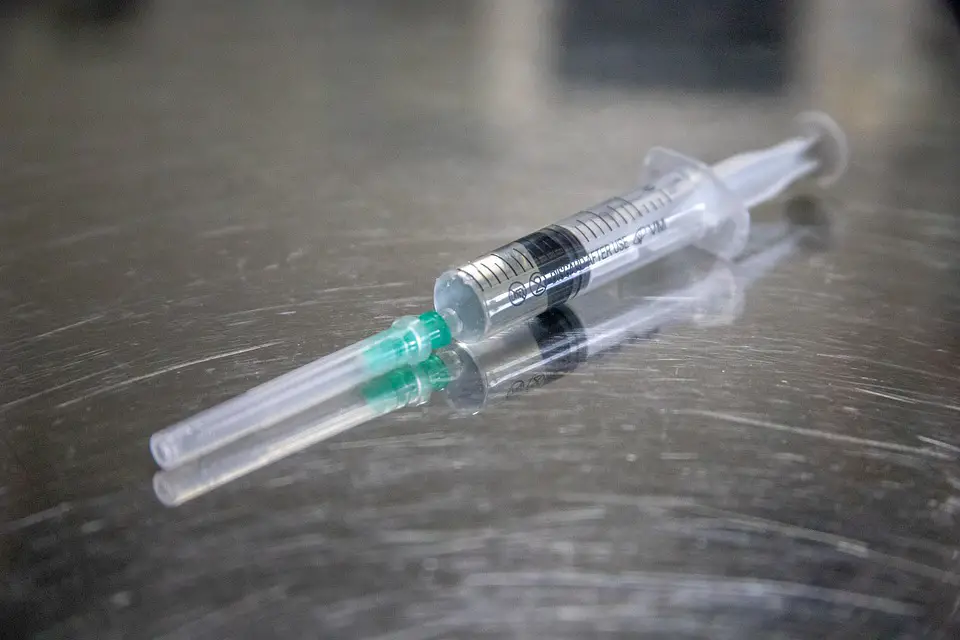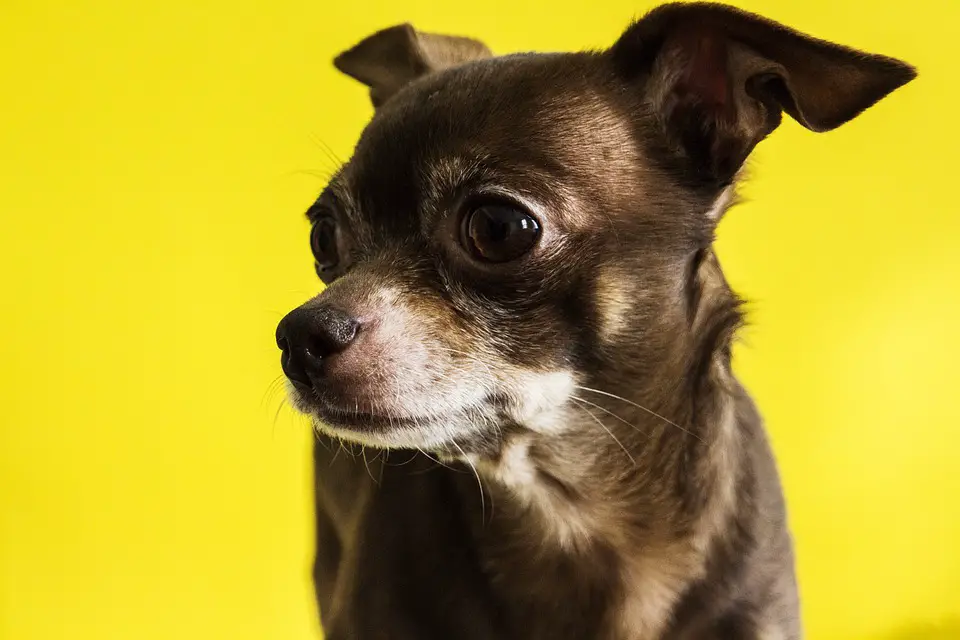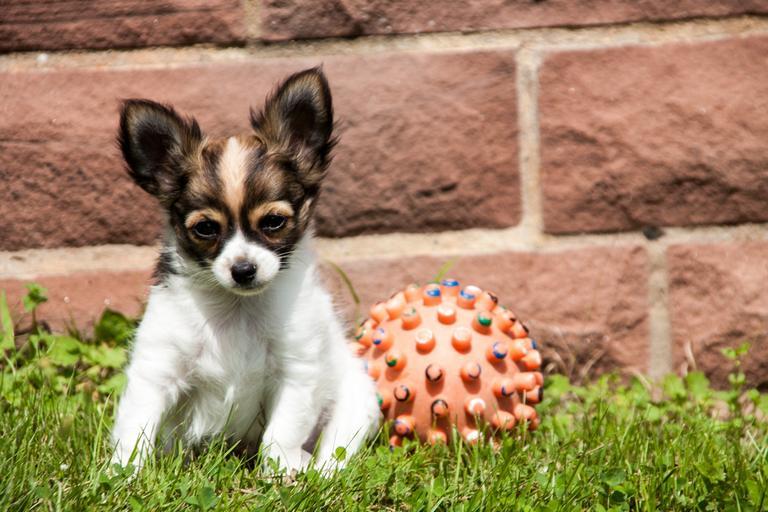Chihuahua puppy vaccinations are an essential part of raising your Chi.
We hope you have read our detailed guide of How To Care for Chihuahua. In case your breeder hasn’t covered your puppy’s vaccinations, it is important that you get them done right away.
Vaccination will help protect your Chi from many potentially deadly diseases. You see, germs are lurking everywhere and your young pet is at a tremendous risk.
Its budding immune system is not equipped to fight these diseases and it is up to us to make sure that it can.
In this guide, we will discuss Chihuahua puppy vaccinations in detail.
Also Read: When Do Chihuahua Puppies Ears Stand Up
Chihuahua Puppy Vaccination Schedule – Week by Week Guide

The American Animal Hospital Association recommends that all puppies receive their first shots between the ages of 6 and 8 weeks.
If the first shot is given at 6 or 8 weeks, then your vet will recommend a schedule of vaccines at 6 weeks, 10 weeks, 14 weeks, and 20 weeks. In short, there should be a period of four weeks between each shot.
If you are picking your Chi from a reputed breeder, s/he will hand over the papers/records of all your pet’s vaccinations done so far.
In case you are adopting a Chi from a rescue home, whoever is handing you your Chi should ideally tell you which first shots are over and the ones that are due.
There will be a series of vaccinations that will go on until your chi reaches its 20th week.
Important Tip: It is important that you follow the Chihuahua puppy vaccinations schedule as advised by your vet.
Because, even a variation of more than a few days from the schedule could leave your Chihuahua vulnerable to infectious diseases.
Also Read: How to Cut Chihuahua Nails
Core and Non-Core Vaccines For Dogs

Before we move on to Chihuahua puppy vaccination schedule, let us understand the classification of vaccines in dog world.
The American Animal Hospital Association or AAHA has classified Canine vaccines as core vaccines and non-core vaccines.
Core vaccines
Core vaccines include all the vaccines that are considered vital to all dogs and are based on a universal risk of exposure.
They can prevent the respective disease, lessen its duration and severity of symptoms, and also reduce the risk of transmission to other animals.
The core vaccines include vaccines against the following diseases:
Distemper
Distemper is a potentially fatal disease. It is a viral infectious disease affecting the central nervous system. In the early stages, it causes vomiting, diarrhea, and other gastrointestinal symptoms. These can progress to pneumonia and seizures. Without timely treatment, many dogs die.
Canine Parvo-virus with or without para-influenza virus
Parvo virus affects millions of unvaccinated dogs and can quickly spread around to harm other dogs. Its early signs are vomiting, lack of appetite and bloody diarrhea.
Often, Parvo results in bacterial infection that can spread around the GI tract and can harm other organs as well.
As per the 2017 AAHA update, doctors can consider whether your pet is at risk to para-influenza and give a combined vaccine with parvovirus.
Adenovirus-2 or Canine Hepatitis
Your doctor might give your Chi a vaccine called the DA2LPP (or the DA2PP-L) which can include adenovirus protection in addition to distemper, leptospirosis, parainfluenza, and parvovirus.
Adenovirus is also called canine infectious hepatitis.
Canine hepatitis affects the liver and many puppies die from liver failure. Initial symptoms include vomiting, diarrhea, lethargy, excess thirst, etc.
Note that if the vaccine is DHPP – then Leptospirosis (a non-core vaccine) is not included in it. Your vet might choose to give it later. The H in the acronym stands for hepatitis which protects against Adenovirus.
Rabies
Rabies is more or less eradicated in the United States. Therefore, some dog owners refrain from giving this shot to their puppies.
In some developing countries like India, rabies is still prevalent.
Hence, it is vital for pet owners here to vaccinate their dog against this deadly and potentially fatal neurological disease in their puppy’s first year followed by an annual booster shot every year.
Rabies is a potentially deadly disease. It can cause the following symptoms:
- Sudden change in temperament
- Difficulty swallowing water or food
- Excessive drooling from the mouth
- Blank expression
- Slack jaw
- Paralysis
- death
The law regarding rabies vaccination in dogs differs from state to state. You can discuss with your vet at the time they hand you your Chihuahua puppy vaccinations schedule regarding the rabies shot.
In some US states, the first rabies shot must be given when the puppy is between 12-24 weeks old. Younger than this, the puppy may not be able to mount a response to rabies, even with the shot.
It is also assumed that up to 12 weeks, your puppy won’t be interacting with infected animals that could carry the rabies pathogens (raccoons, stray dogs, bats, or foxes).
By the time your Chi is 6 months old, it is old enough to get infected itself and also to carry the rabies pathogens that could harm other animals in its vicinity.
So, speak to your vet regarding the rabies vaccine mandate in your state.
Also Read: Best Vitamins for Chihuahua
Non-Core Vaccines
Non-core vaccines are not considered mandatory and are usually given to dogs that may be exposed to the infection.
You and your vet can review which of these vaccines your Chihuahua might need based on exposure.
Canine influenza or Dog flu
Note that this is different that para-influenza which is one of the core vaccines.
In addition to hacking cough, this highly contagious disease can quickly spread to other animals in an infected dog’s surrounding. It can also cause pneumonia and subsequently death.
Bordetella
Bordetella is one of the pathogens that can cause Kennel cough. It is available as injections as well as nasal drops.
Not all dogs need this vaccine
However, if you plan on boarding your Chihuahua at a dog hostel or enrolling it in puppy obedience school, then it is important that you discuss this vaccine with your vet.
Kennel cough, in small puppies, can cause pneumonia which could be fatal. Other symptoms of kennel cough are loud hacking cough, fever, chills, and seizures.
While the vaccine cannot 100% prevent kennel cough, it can decrease the severity of symptoms.
Note that kennel cough can be caused by bacteria as well as viruses. Canine parainfluenza can also cause kennel cough.
Some bacterial forms of kennel cough are extremely contagious. As a result, most kennels and boarding facilities insist you show them the record of this vaccine in case you plan on boarding your Chihuahua.
Lyme disease vaccine
Lyme disease is a potentially deadly disease caused by tick bites. If you live in a tick-infested area, then it is important to protect your Chi from this disease.
Lyme disease is increasingly found in the North Eastern states as well as Texas, Florida, and states in the Mid-West.
Vaccination against Lyme disease does not guarantee that your pet won’t get it, but it can definitely reduce the severity of symptoms.
Common symptoms of Lyme disease include:
- Fever
- Chills
- Lack of appetite
- Lethargy
- Joint aches
Leptospirosis
This is a life-threatening bacterial infection that can affect the liver and kidneys. It is very common in Eastern parts of United States, as well as some parts of southern USA and West Coast too.
Unfortunately, there are thousands of different strains of bacteria that can cause leptospirosis.
The vaccines your Chihuahua receives will protect it only against some of common Lepto strains including canicola, grippotyphosa, etc.
Therefore, just because your Chi has received the Leptospirosis vaccine, doesn’t mean that it may not get this infection at all.
Some doctors include Lepto as part of the core vaccines and your pet might receive the DHLPP or the DA2LPP vaccine.
Now let us move on to your Chihuahua puppy vaccinations schedule – week by week
Chihuahua Puppy Vaccinations Schedule – Week by Week

Six to Seven Weeks
Most breeders cover these early shots if they plan to hand over your pet once it is 8 weeks of age. This is the right age for a puppy to leave its dam and littermates.
Your pet must receive the Distemper, Hepatitis, Parvovirus, and Para-influenza vaccines in this period. It could also receive the non-core Bordetella vaccine in case you wish to socialize your Chi with other dogs.
Nine to Ten Weeks
If your pet has had its first shot at 6 weeks, then bring it in for the next round of shots at 10 weeks.
Alternatively, if you have had your Chi puppy vaccinated at 8 weeks, then bring it to the vet after 4 weeks or in its 12th week.
This means there should be a gap of 4 weeks between the shots and its boosters.
During this week, your pet will get a booster for the above diseases (Distemper, Hepatitis, Parvovirus, Para-influenza and Bordetella vaccines) along with a shot for Leptospirosis.
Twelve to Thirteen Weeks
In this period, your pet will receive several booster shots along with some non-core vaccines.
The reason for so many shots is that your pet might lose some of its immunity it has received due to its mother’s milk. Also, their adult immunity hasn’t yet kicked in.
The vaccines your Chihuahua will receive are: Distemper, Hepatitis, Parvovirus, Para-influenza and Leptospirosis boosters.
Your vet might ask you about your Chi’s lifestyle and consider the non-core or optional vaccines for Canine Influenza and Lyme disease as well.
Fifteen to Seventeen Weeks
In this period, your Chihuahua will again get the core vaccine boosters for Distemper, Hepatitis, Parvovirus, Para-influenza along with Rabies, and boosters for Canine Influenza and Lyme disease as well.
Also Read: When Do Chihuahuas Stop Growing
Summary of Chihuahua Puppy Vaccinations with Approximate Costs

| Chihuahua’s Age | Core vaccine | Non-core vaccine | Price of vaccines*** |
| 6 to 7 weeks | DHPP or Distemper, Canine Hepatitis, Parvo Virus, and Para-influenza | Bordetella | Core vaccine costs $75 to $100 while Bordetella between $19 and $45 |
| 9 to 10 weeks | Distemper, Hepatitis, Parvovirus, Para-influenza vaccines | Bordetella along with a shot for Leptospirosis. | Core vaccine costs $75 to $100 while Bordetella between $19 and $45 |
| 12 to 13 weeks | DHPP booster | Canine influenza/HN38, Leptospirosis, and Lyme disease vaccine | Core vaccine costs $75 to $100, Lyme disease vaccine – $15 to $30 and HN38 vaccine $25 to $30 |
| 15 to 17 weeks | DHPP booster and Rabies | Canine influenza/HN38 and Lyme disease vaccine | Core vaccine costs $75 to $100, Rabies cost between $15 and $20, HN38 vaccine $25 to $30, Lyme disease vaccine – $15 to $30 |
*** Price of vaccines varies from practice to practice and state to state.
Puppy Booster Vaccination Controversy
There is some controversy surrounding the annual booster DHLPP shots. Some members of veterinary scientific community believe that once a dog reaches adulthood, its natural immunity kicks in.
As a result, they feel that an annual booster isn’t necessary.
Also, the USDA states that vaccine validity is for about 3 years. Some doctors are also concerned about potential risks of booster and believe that we may be over-vaccinating our pets.
Resultantly, more and more vets are stating that immunity from the boosters remains for about 3 years. The American Animal Hospital Association now recommends giving an adult Chihuahua (or any adult dog for that matter), a booster shot every 3 years instead of once a year.
Important tip: It is still very important that you take your pet for a vet checkup regularly – at least once a year for annual physical exam.
Also, certain boosters need frequent updates including those for kennel cough, leptospirosis, Lyme disease, and rabies.
Vaccinating an Older Chihuahua

In case you are doing the noble deed of adopting an older or adult Chihuahua, then chances are that the previous owner or shelter has its vaccination records.
Many shelters often vaccinate and deworm all their dogs prior to handing them over to potential owners.
If you do not have clear records of your older Chi’s previous vaccines, please don’t hedge your bets and make sure you get it the DHLPP boosters right away.
Vaccination Risks – What You Should Know
Many people are against vaccinating their dogs.
We would not recommend this at all.
We believe that all core vaccines are very safe and the diseases they have been developed for are known to cause significant disease and even death.
Also, many of the diseases that the core vaccinations are known to prevent are still prevalent in many parts of the United States. They are also readily transmissible.
In addition, most of these vaccine are very safe and even if they do not prevent the disease 100%, they could definitely reduce the severity of the symptoms they cause.
In fact, many vaccines provide protection to your Chihuahua so that it will develop minimal symptoms or clinical signs of the disease.
Mild side effects of the vaccines are:
- Fever
- Lethargy and malaise
- Pain or myalgia
- Soreness or redness at the site of the injection
- Runny nose
- Appetite changes
You can ask your vet about some pain relieving medicine for your Chihuahua in case the above symptoms occur.
For a Chi weighing about 5 lb., you can give 5mg of Benadryl for symptomatic relief.
The symptoms usually disappear after a day or two.
However, if these symptoms persist or your Chi develops swelling, hives, severe itching, persistent vomiting/diarrhea, or has seizures, rush it to the vet right away.
FAQs on Chihuahua Puppy Vaccinations

1. What happens if I am late on my Chihuahua’s puppy vaccination schedule?
Speak to your vet if you have missed your puppy’s DHLPP shots or booster.
In most cases, it is better to give the shot as soon as possible than not give at all.
Please remember that your Chi is at great risk since its immunity towards these canine diseases will be lower without the booster.
In case your pet happens to come in contact with other dogs, wild animals, etc. then its risk to contract these diseases is very high.
2. When should my Chihuahua puppy get its shots?
Your Chi puppy should get its first core shots between 6 and 8 weeks followed by boosters after every 4 weeks.
Core vaccines will protect your Chihuahua from canine distemper, canine hepatitis, leptospirosis, parvovirus, and para-influenza.
3. Can I take my Chi out after its first vaccination?
We understand that you are very keen for everyone to meet your Chi.
However, it is best to limit your pet’s interactions with un-vaccinated animals at least till all of its core vaccinations as well as rabies shots are covered.
You can take your pet to interact with vaccinated dogs after its first vaccination is done.
In the United States, rabies is more or less eradicated. However, wild animals like raccoons, foxes, and bats can still carry these pathogens.
Please ensure that your pet does not come in contact with such animals.
4. How long can my Chi go without shots?
The maximum interval between 2 vaccine booster shots is between 4 to 6 weeks. Remember that the longer you delay getting your pet inoculated, the greater is its risk of contracting deadly canine diseases.
Conclusion – Chihuahua Puppy Vaccinations
Chihuahua puppy vaccinations should ideally begin around the age of 6 weeks to 8 weeks. Your pet must get its core vaccines for distemper, parvo virus, leptospirosis, para influenza, and canine hepatitis.
These are potentially deadly diseases and the core vaccine along with regular boosters at the right intervals can protect your pet and enhance its immunity against them.
You must also discuss optional vaccines like Rabies and Lyme diseases as well as the Kennel Cough vaccine and whether your Chi needs them.
Your adult Chi will need a booster once a year or once every 3 years. Your vet is the best to guide you about this schedule.
We hope this guide covers all the questions you may have about Chihuahua puppy vaccinations.


